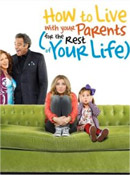7-14-14
Huffington Post – How to Write a Show About Living With Your Parents (for the Rest of Your Life, Possibly)
Sixteen years ago my 18-month-old daughter and I moved in with my parents. Suffice to say, this wasn’t a high point in my life. I was a former child actress (Diana Fairgate on Knots Landing). I had spent my twenties recovering from being on television. I hadn’t gone to college, my marriage was over, and I was in the latter section of my early 30’s. So, my daughter and I slept on a piece of foam in my parents’ weight room while I tried to figure out what the — there’s no other word than “fuck” — I was going to do. I don’t know why this has so much meaning for me, but I was so broke I kept my money in a coffee can. (Café La LLave, the coffee can slash piggy bank of giants). Surprisingly, the solution was me writing a spec script which turned into a Showtime show making light of my humiliations — Rude Awakening. It was eighteen years after I’d been cast on Knots Landing, so my joke at the time was: “every eighteen years, something unbelievable happens to me.”
At that point, most people would’ve moved out of their parents’ house. I doubled down and bought a house with them. I was still a single mom, and even though my ex-husband was a great dad and very much a part of our daughter’s life, the struggle of my early adulthood was like an incurable mental virus — I couldn’t shake the idea that everything could fall apart again. I mean, of course it could. I grew up in show business — one month you ate caviar and lobster on Thanksgiving, (a real thing my parents and I really did), and the next your stepfather yelled at you for using too much toilet paper. (I must confess I use a ridiculous amount, like a toilet paper mitten). Could I make it on my own? Maybe I’d moved out of my parents’ house too early in the first place.
After Rude Awakening, I worked on other shows. My living situation usually elicited the response, “You should pitch a show about that,” from my peers. The first time I tried selling it, about ten years ago, the network executive said, “How are we not going to think the lead character is pathetic?” “Do you think I’m pathetic?” I responded. There was a long beat.
Every time I had an opportunity to write a pilot, my real life would come up. Well, I’d bring it up. “Why can’t I do a show about this?” I’d ask and launch into another story. (They were easy to launch into since they were always happening). For instance: My parents throw this huge Oscars party every year. During the Halle Berry year, we were all gathered around the TV watching as Sidney Poitier walked out to accept his lifetime achievement award. I was on one side of the room, my mom was on the other. I looked at her, misty eyed, as if to say, “Isn’t this a great moment?” My mom, a former actress and stand up comedian, mouthed back to me, “I fucked him.” I looked at her like, “What?” She nodded her head, proudly. I thought, “Wow, my mom had sex with Sidney Poitier… what great timing for her to wait for this moment to tell me.”
As for my stepfather (Mark Lonow, co-owner of the Improv), his hobbies include building things and hurting himself in the process. (He sliced off the top of his finger constructing a shed.) He enjoys currency trading — his home office has four gigantic computer screens on which he trades; it looks like the lair of a low budget super villain. Oh, and of course he wrote a mercifully unpublished crime novel with major S&M undertones (dungeons, nipple clamps) that is super uncomfortable to hear about. A health nut who goes for runs in his jeans and sweater, he has many health problems (heart murmur, testicular cancer, high cholesterol), and the fact that my mom drinks and sneak-smokes and never gets sick drives him nuts. If you were with me in my home office right now, you could look through my window and see my stepfather, in his t-shirt and underwear, pumping away on his recumbent bike. And now he’s grunting.
I couldn’t sell the pitch, but I continued developing the material in spoken word shows. My Greenwich Village childhood crept into the narrative. I was the original latchkey kid. My afterschool program was me hanging out with an old hot dog vendor known as “John the hot dog man.” That sounds ominous enough, but he was also missing several key teeth and his hot dog cart was plastered with pictures of children. So basically, your classic first suspect on Law and Order: SVU. And then there was my parents’ nontraditional approach to childhood fears. To get me over my fear of dogs, my mom and stepfather got me a dog. The dog turned out to have hereditary insanity, but we didn’t know it, because how exactly does one diagnose that? I named him Pow Wow. Pow Wow had the temperament of a speed freak… he couldn’t handle doorbells, he was a biter and he felt very possessive of the garbage. Eventually I couldn’t be alone with him unless he was tied to the radiator. We didn’t want to get rid of the dog, because that would mean we’d failed as a family. So, at night, while my parents did improv around Manhattan, I’d sit on the couch, watching TV, Pow Wow pulling at his leash, going, “grrrrr.” All this exploration started to sound like the actual reasons I still needed my parents. I hadn’t had their attention when I was younger, so I sort of demanded it as an adult.
But every time I pitched it there were reasons it couldn’t be done: it had a female lead, my life was so show business-y, and, my favorite, it sounded fake because there are already so many pilots with that premise. I’d argue: “But I’m the only television writer who actually lives with her parents.”
I’ve always been ahead of the curve… a trendsetter. I was one of the first teenage television actors to develop a coke addiction, I was into Blondie way before “Heart of Glass,” and I moved in with my parents when the economy was great. Suddenly, the economy caught up with me. For the first time in my life, my story was relatable. Also, it took so long to sell, by the time I pitched it again last year, my daughter was on her way to college. The story had a happy ending. It wasn’t tinged with panic and dread anymore. Maybe I really did come off as pathetic when I first pitched it. Maybe I was. But who cares? Apparently, my parents, my ex and I comprise one functioning adult and we did a great, nontraditional job of raising my daughter. And Sarah Chalke, Elizabeth Perkins, Brad Garrett, Jon Dore, Stephanie Hunt, Rachel Eggleston and Joe Wengert did an awesome job acting it all out in How To Live With Your Parents (For The Rest Of Your Life). So check it out — most of it really happened — when it premieres on April 3 at 9:30 p.m. ET/PT on ABC.
——-
Originally posted on:







FOLLOW CLAUDIA